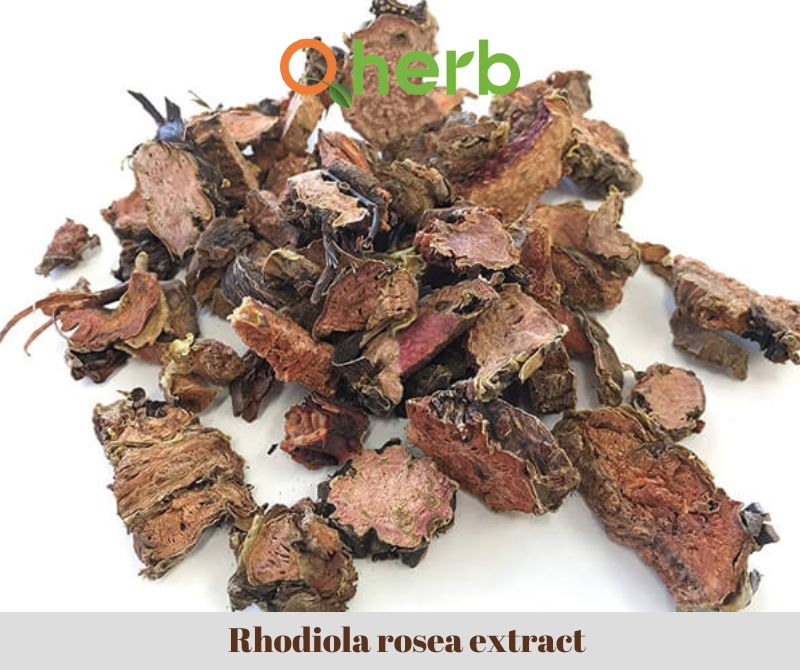medicinal properties and contraindications
Rhodiola rosea is a well-known adaptogen, often referred to as the “golden root” or Siberian ginseng— a northern plant resistant to cold (surprisingly not pink in color). If you scrape the dried root, you can see the lemon-yellow color of the cork, on breaking, it is pinkish-brown, with a smell that slightly resembles the smell of a rose (hence the name of the plant).
The beneficial effect is determined by the characteristic for rhodiola biologically active compounds Rosavin (antraglycosides), Salidroside and Tyrosol. In addition, Rhodiola contains flavonoids, tannins, glycosides, and is also rich in organic acids, such as malic, lemon, etc. The extract is obtained from the roots of a plant by the method of water or alcohol extraction, followed by concentration and drying.
Plant components can increase the protective function of red blood cells, which greatly increases the resistance of the nervous system to stressful situations. Plant-based drugs activate the production of glucose and oxygen in the blood, which improves brain function and concentration, relieves mental and physical fatigue, providing the body with reserve forces.
Rhodiola rosea extract is able to normalize pressure, increase the elasticity of the walls and the patency of blood vessels, and reduce migraine pain. Plant components have an antimicrobial effect on staphylococcus bacteria, a gonorrhea bacillus, leveling the formation of cancer cells. Rhodiola rosea extract is effectively used for the release of alcohol dependence, smoking and drug (opium) dependence.
Rhodiola rosea is also popular in cosmetology: creams have a regenerating, rejuvenating, nourishing effect. It supports the skin and increases protection from the adverse effects of the environment. They improve metabolic processes, delay the loss of moisture, remove dryness, inflammation and slow down the aging process of the skin.
How to apply Rhodiola rosea?
Rhodiola rosea extract is used in folk medicine in the form of decoctions, infusions, lotions and compresses externally. Its juice treat inflammation of the gums, conjunctivitis, boils, and cleans wounds. Broths are used to rinse with diseases of the throat.
Infusion
Infusion is used for colds. To prepare it, take 15 g of dried root, pour 300 ml of boiling water, leave for four hours, wrapped tightly. Take the infusion half an hour before meals, three times a day for half a cup.
Tincture
Rhodiola rosea in the form of tincture helps with hypotension. For tincture you need to take 50 g of crushed roots, pour two glasses of vodka and insist, periodically shaking the container, two weeks in a dark place. At first, drink 5 drops three times a day, half an hour before meals, then gradually increase the dose to 10 drops.
Decoction
Broths help in the treatment of diseases of the heart system, strengthen blood vessels, increase the elasticity of their walls. The use of decoctions helps with diseases of the thyroid gland, anemia and high blood sugar. Rinsing decoction relieves toothache, and inflammation and irritation on the skin of the face by rubbing.
How it is useful for a person?
Rhodiola rosea extract has anti-inflammatory and tonic effect on the skin, slows down its aging, and has lifting properties. Therefore, it is often used in the means for fading and aging skin. It protects the skin from environmental influences, improves skin turgor, and helps preserve moisture in it. The extract is also well suited for oily and blended skin.
Effectively rejuvenates the skin and slows down aging, protecting it from negative environmental factors, prevents the formation of wrinkles, neutralizes the effect of free radicals, helps restore the physiological properties of the skin. In addition to soothing, detoxifying, rejuvenating and preventing aging, Rhodiola Rose eliminates dryness and irritation of the skin, making it smooth and velvety.
How it is useful for the body?
It has a stimulating and anti-inflammatory effect. Removes fatigue from the feet, is used in regenerating means for the body, and prevents the formation of excess deposits in the subcutaneous fat. Restores and tones the skin, stimulating metabolic processes at the cellular level. In addition, the extract of Rhodiola Rosea has a mild warming effect, increasing trophism in the tissues, but without causing expansion of the vessels.



 Healthier Future
Healthier Future